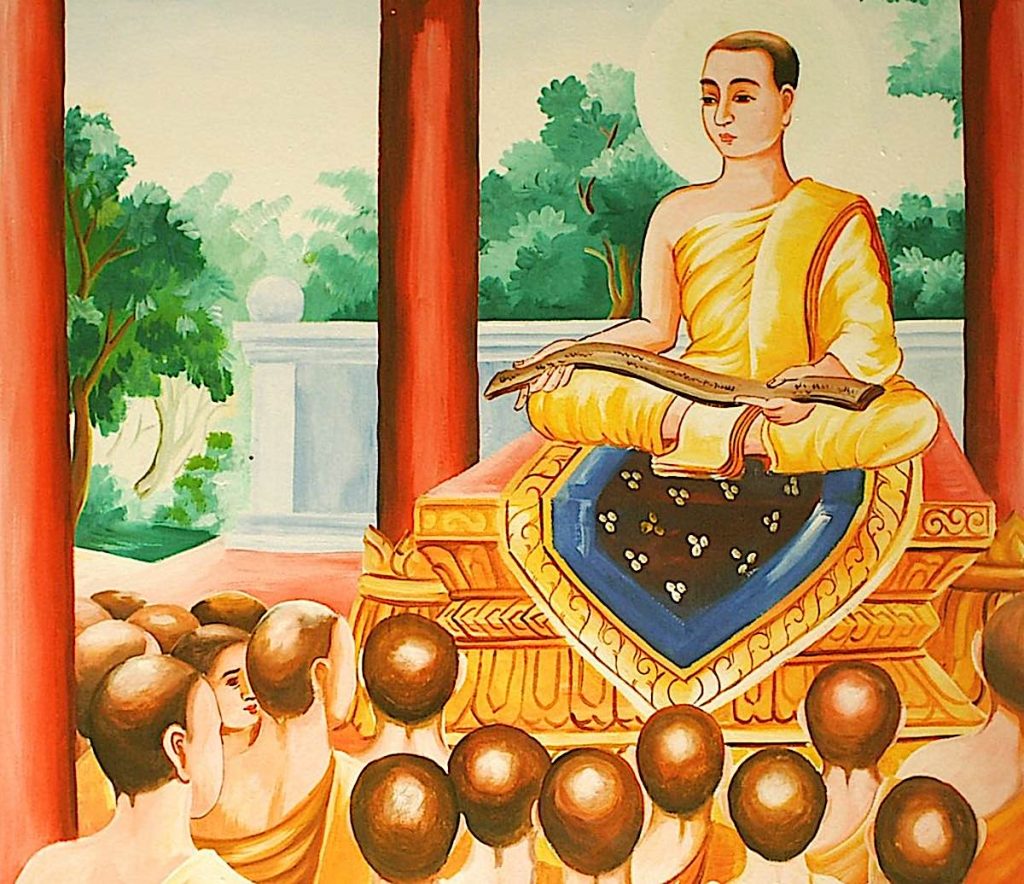One of the most unique and captivating of Pali Suttas actually records events after Buddha passed away. Why, then, if Buddha is not teaching, is this interesting? Aside from the fascinating historical perspective, it carries a vey profound and important message:
The Dhamma is our arbitrator.
Often, we hear modern-day teachers say, “We take refuge in the Three Jewels — Buddha, Dharma and Sangha — but the most important of these is Dharma.”
Iconic of this important concept is a monastery painting in Laos depicting Sattapitaka — years later — teaching Sutra at the First Buddhist Council.
The Dhamma — the Dharma and the Suttas or Sutras — are the “concord” that holds together the Buddhist Sangha. Buddha was teacher, but what is vital to the profound power of Dharma is the “teachings.” The same holds true of the non-monastic student of Buddhism. The Dharma (Dhamma) is our true guide.
- Did you know Buddha Weekly has an entire feature section dedicated to Sutta or Sutra? Visit it here>>
After Buddha Passes Away
One of the sources of this meaningful teaching is actually the Gopaka Moggallana Sutta, where Ananda is patiently explaining to a Brahmin why Buddhism will have supreme relevance long after the precious Buddha has “passed away.” In previous Suttas (Sutras) we saw how agonized the monks — and especially Ananda — are when confronted with Buddha’s paranirvana. Yet, here is Ananada explaining to a guardsman and an Brahmin why the Dharma (Dhamma) is the most important thing — in a Sutta that is recorded after the Buddha passed away.
The Brahmin is asking tough questions, about the validity of the Buddhist Sangha after Buddha departs the world samsara:
“Then is there any one monk authorized by the Sangha and appointed by a large body of elder monks [with the words], ‘He will be our arbitrator after the Blessed One is gone,’ to whom you now turn?”
“No, Brahman. There isn’t any one monk authorized by the Sangha and appointed by a large body of elder monks [with the words] ‘He will be our arbitrator after the Blessed One is gone,’ to whom we now turn.”
“Being thus without an arbitrator, Master Ánanda, what is the reason for your concord?”
“It’s not the case, Brahman, that we’re without an arbitrator. We have an arbitrator. The Dhamma is our arbitrator.”
Another variation on this theme is the metaphorical: Buddha is the Doctor, Dharma is the Medicine, Sangha is the Support. Clearly, when we are sick, the medicine matters the most. Dharma is our medicine.
There can be no doubt that to have a teacher such as Gautama Buddha would be incomparable, yet there can also be no doubt from this dissertation, that even more excellent — at least from the point of view of students who cannot learn directly from the Buddha — is the Dharma itself. The teachings. Ananda finishes this sutta with:
“Didn’t I just tell you, Brahman? There isn’t any one monk endowed in each and every way with the qualities with which the Blessed One — worthy and rightly self-awakened — was endowed. For the Blessed One was the arouser of the un- arisen path, the begetter of the un-begotten path, the expounder of the un-expounded path, the knower of the path, the expert with regard to the path, adept at the path. And now his disciples follow the path and become endowed with it after him.”
Thanissaro Bhikku’s Translator’s Note:
“This discourse presents a picture of life in the early Buddhist community shortly after the Buddha’s passing away. On the one hand, it shows the relationship between the monastic community and the political powers that be: the monks are polite and courteous to political functionaries, but the existence of this discourse shows that they had no qualms about depicting those functionaries as a little dense. On the other hand, it shows that early Buddhist practice had no room for many practices that developed in later Buddhist traditions, such as appointed lineage holders, elected ecclesiastical heads, or the use of mental defilements as a basis for concentration practice.”
Gopaka Moggallana Sutta
Moggallana the Guardsman
MN 108
Translated from the Pali by Thanissaro Bhikkhu
I have heard that on one occasion Ven. Ánanda was staying near Rajagaha in the Bamboo Grove, the Squirrels’ Sanctuary, not long after the Blessed One’s total Unbinding.
Now at that time King Ajatasattu Vedehiputta of Magadha, suspicious of King Pajjota, was having Rajagaha fortified.
Then in the early morning, Ven. Ánanda, having put on his robes and carrying his bowl and outer robe, went into Rajagaha for alms. The thought occurred to him, “It’s too early to go for alms in Rajagaha. What if I were to go to the Brahman Moggallana the Guardsman at his construction site?” So he went to Moggallana the Guardsman at his construction site. Moggallana the Guardsman saw him coming from afar, and on seeing him said to him, “Come, Master Ánanda. Welcome, Master Ánanda. It has been a long time since Master Ánanda has found the time to come here. Sit down, Master Ánanda. Here is a seat made ready for you.”
So Ven. Ánanda sat down on the seat made ready. Moggallana the Guardsman, taking a lower seat, sat to one side.
As he was sitting there, he said to Ven. Ánanda: “Master Ánanda, is there any one monk endowed in each and every way with the qualities with which Master Gotama — worthy and rightly self-awakened — was endowed?”
“No, Brahman, there isn’t any one monk endowed in each and every way with the qualities with which the Blessed One —

